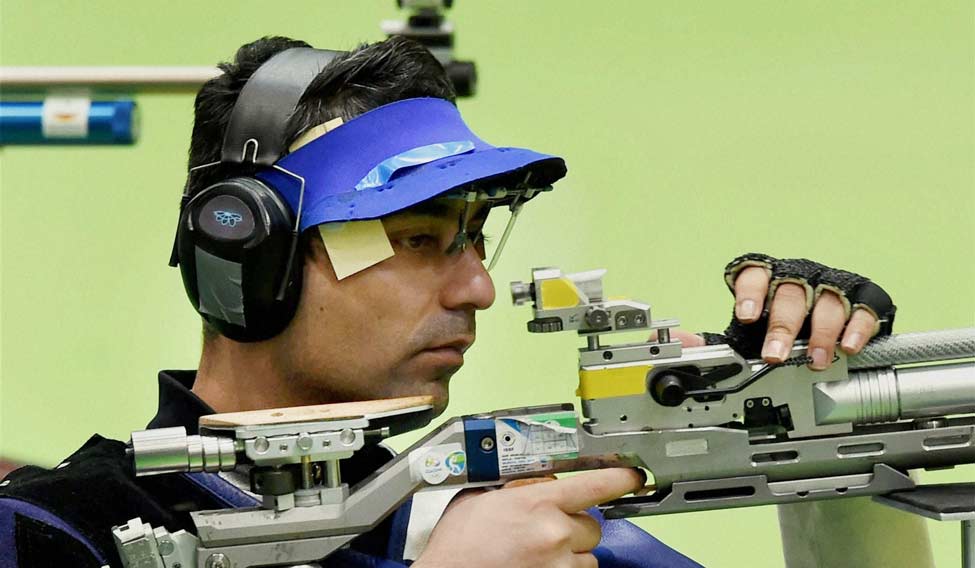With five shooters already out of the fray—including medal prospects Jitu Rai, Heena Sidhu and Apurvi Chandela—all eyes will be on India's golden boy of shooting, Abhinav Bindra as he takes the field in the finals of the 10m air rifle later in the day. He qualified with a score of 625.7, which saw him clinch the seventh position. Gagan Narang, however, crashed out in the qualification round.
Expectations were sky-high from the 12-member contingent as shooting has paid fairly rich dividends in recent past—17 medals (4 gold, 9 silver and 4 bronze) at the 2014 Glasgow Commonwealth Games and 9 medals (1 gold, 1 silver and 7 bronze) at the Incheon Asian Games the same year. But the hopes now mainly rest on the experienced fingers of Bindra.
While Bindra won the gold in 10m air rifle at the 2014 CWG, he had to settle for a bronze at the Asian Games. Not to forget an empty-handed return in 2012 London Olympics. A disappointment that has only intensified his hunger for the yellow metal this year. The Glasgow Games was his last Commonwealth Games and Rio will be his Olympic swansong.
One might remember that for the first half of the 2014 CWG finals, it was his compatriot Ravi Kumar who hogged the limelight. But Kumar's fall was matched by Bindra's rise who rose through the standings steadily to clinch the gold with a total of 205.3, ahead of Bangladeshi A. Baki, who took silver with 202.1, and England's D. Rivers, who won bronze with 182.4.
Experience, it was, that helped Bindra to remain composed. After all, the soft-spoken shooter from Dehradun started young—as the youngest participant in the 1998 Commonwealth Games at 15 years.
In the 2000 Sydney Olympics, Bindra scored 590 and was 11th in the qualification round. He did not qualify for the finals since only the top eight made it to the finals. Bindra was the youngest shooter at the Sydney Olympics and also became the youngest person to represent India at Olympics. He was awarded the Arjuna award that year.
His breakthrough came when he won the bronze at the 2001 Munich World Cup with a new junior world record score of 597/600. The same year he was honoured with the Rajiv Gandhi Khel Ratna Award, India's highest sports award, becoming the youngest recipient of the award.
At the 2006 Melbourne Commonwealth Games, he won the gold in the pairs event and the bronze in the singles. He also picked up gold at the 2006 ISSF World Championships but missed the 2006 Asian Games at Doha because of a back injury.
The back injury was so severe that he was unable to compete or even lift a rifle for a year. Bindra, however, made a powerful comeback at the 2008 Beijing Olympics, becoming the first Indian to win an individual gold medal at the Olympics.
He joined forces with Narang to win the pairs gold at the 2010 Commonwealth Games in Delhi. He also won the team silver at the 2010 Asian Games in Guangzhou.
At 34, Bindra is the only Indian to have held both the World and the Olympic titles simultaneously.
His achievements, however, are not restricted to the shooting arena alone. Bindra, who holds a Bachelor of Business Administration degree from the University of Colorado, US, is the director of Abhinav Hotels and Inns Pvt. Ltd and the CEO of Abhinav Futuristics, the sole distributor of Walther arms in India. He also penned an autobiography, A Shot at History: My obsessive journey to Olympic gold, with sports writer Rohit Brijnath.
He is also the chairman of the ISSF’s athletes’ committee.
Bindra's achievements, especially after the injury, might be difficult to comprehend, but only till you come across his motto—“Whatever your mind can conceive, your heart can believe, you can achieve.”





